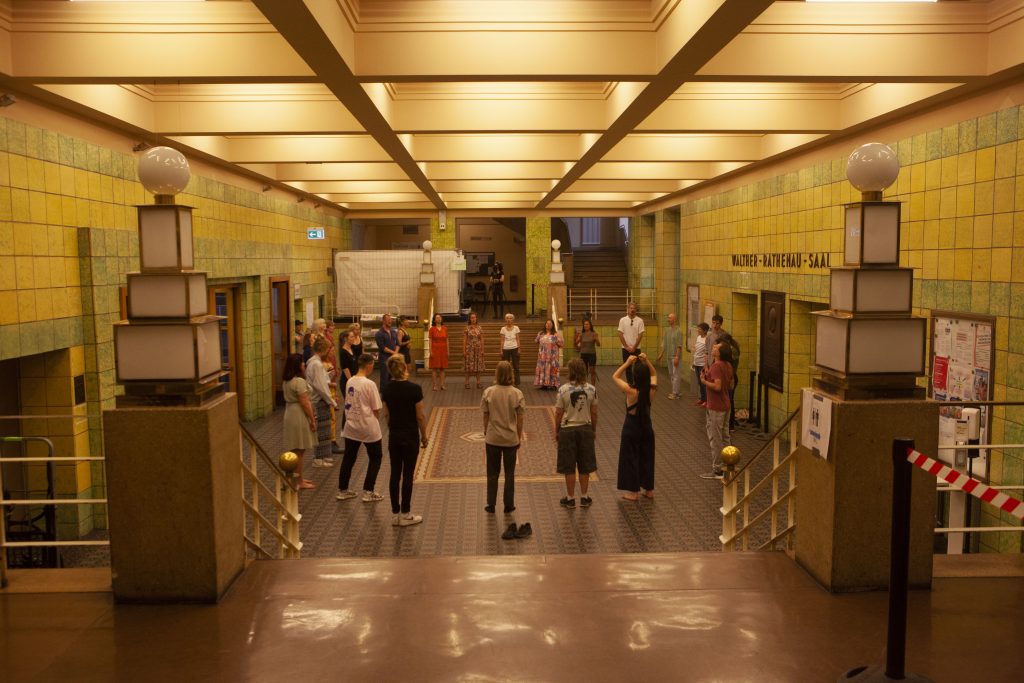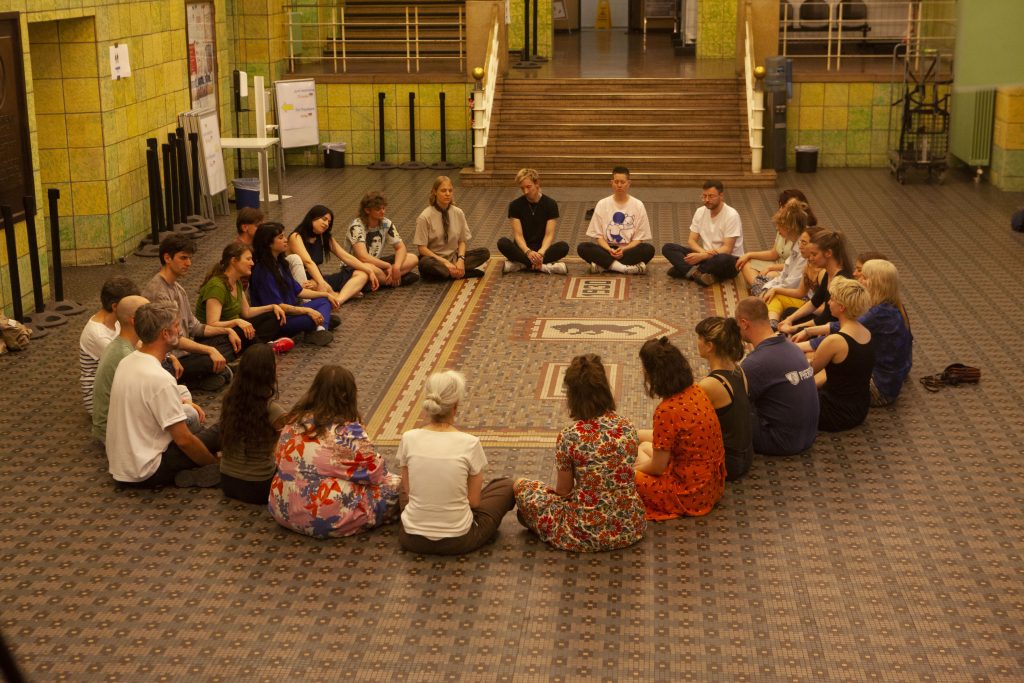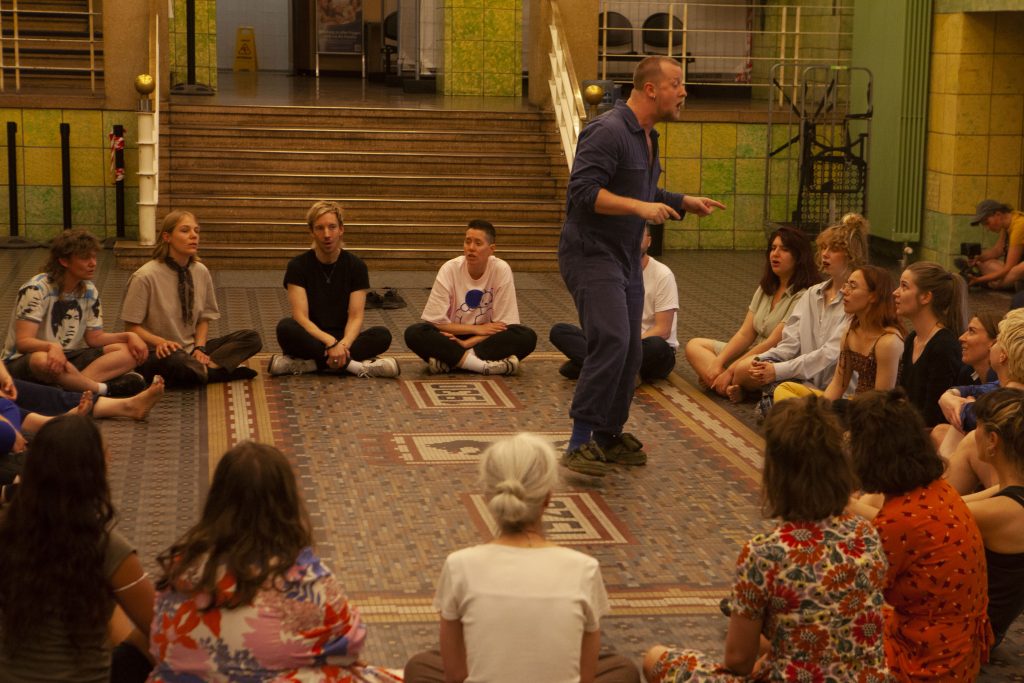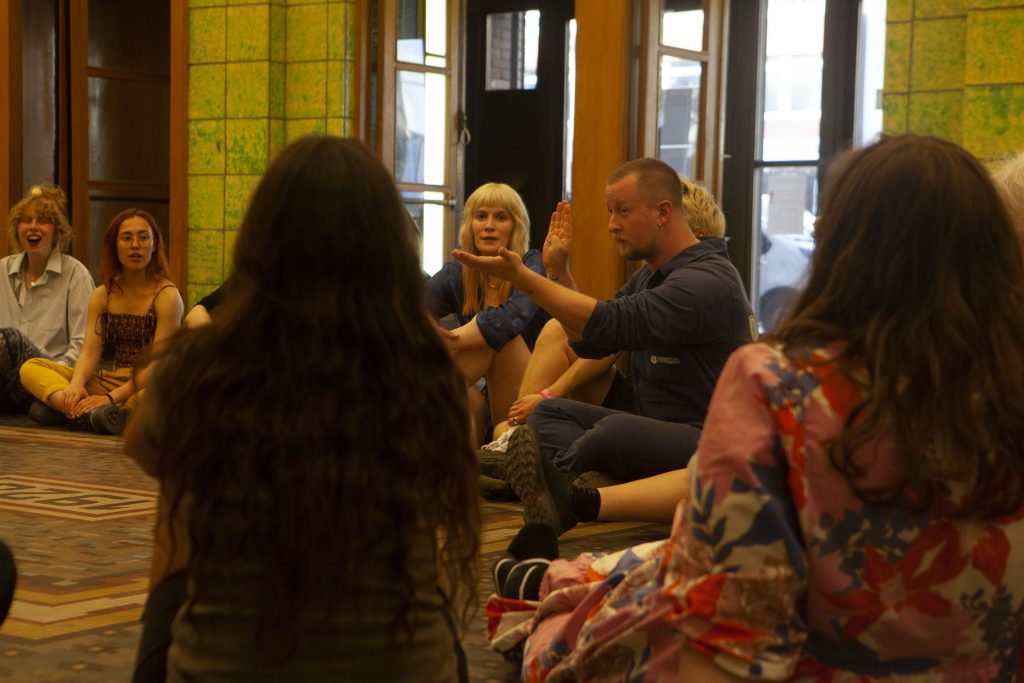



XOIR (pronounced like the regular word choir, or “Qwire/qWHYr”) is a perpetually evolving modality of group singing led by Colin Self, focused on fostering a generative environment for individuals to connect with their voice on an individual and collective level, regardless of previous experiences of singing. Rooted in experimentation, improvisation, and play, the methodology of XOIR inverts the conventional organizing principles of group singing, prioritizing collectively-authored, curious new forms of vocalizing and listening.
Since it’s origins in 2013 in New York, XOIR continues to evolve and mutate through several threads of research.
XOIR sessions have been held in venues around the world including the KW, 3HD Festival, Floating University, ACUD Macht Neu, Gropius Bau, and various other Berlin venues; at Performance Space New York and New York Live Arts; in Montreal at Studio 303 for Be Heintzman Hope’s “wxmb cxre”; for The School of Temporary Liveness in Philadelphia; in Krakow as part of UNSOUND; in Toulouse for CAMP.fr, in Rotterdam for Regenerative Feedback; at FUGA in in Zaragoza, Spain, and an always-expanding list of places and institutions. Most recently XOIR has been staged in Los Angeles by Living Earth, and by Actualize in Seattle, Washington.
Several participants from XOIR have gone on to lead their own XOIR practice in Washington, Wisconsin, California, New York, Poland, Algeria, France, Germany, The Netherlands, England, Canada, Mexico, amongst other countries and states.
At times meditative and at others cacophonous, XOIR activities vary greatly in form, often responding to necessity and the circumstance of the participants in their environment.
With XOIR there is no recording and seldom an audience. In a world of perpetual extraction, a vital thread of the un-recorded nature of the practice offers participants both the reminder that not all art and music needs to be quantified and measured for value by an outside ear, and to encourage the existance of music practices that can exist outside of the recorded music streaming-industrial-complex.
XOIR is open to anyone interested in exploring their voice as a tool for learning or re-posturing a new relationship to singing and listening. Prior participation in choral or vocal practices is not required, but any prior experience with listening and engaging experimentally in a musical or studio practice is welcomed.
A brief introduction to the modality is available here via UNSEEN.
XOIR works with a logic of being “autonomous together”, meaning that we all enter into a session with different relationships to our bodies, to listening, to sound-making. We are not looking to assimilate in our experience. Instead we are working to make space for a pluralistic experience we can have together.
ABOUT THE NAME:
You have probably noticed the augmented spelling which was decided to both have this workshop become expansive beyond being considered just a choral practice, but a mythic name for a platform that can continue to generate and evolve based on it’s myriad participants and activities. Re-named by XOIR participant Kai (Kari) Altmann:
The X signifies both ancient and future languages and can be tied to complex mapping of linguistics between Euskara, Mexico, India, China, Slavic land– and points toward a kind of bootleg global language, a complex conversation amongst a myriad of histories.
In the archives of exchanges between founding members of XOIR, I found an email from Kari Altmann, who had spelled it XOIR, which was the origin of the X being added to the spelling. When asked to elaborate on the use of the X ( a common occurrence in Altmann’s practice ) she mentioned a few anchor points that felt integral to the modalities of our group sessions.
Altmann: I use a lot of X'es in my naming of things because it's a letter that is used in a lot of ancient source languages...it's kind of like a scrambler? I started getting into it with super old linguistic things in Mexico and then in Euskera in Basque country when I lived there...supposedly linguists have a hard time tracing exactly where Euskera was "birthed" from and their surprising use of X's seemed like a clue. Then as I keep traveling I keep finding the linguistic X: in Goa, in China and east Asia, in some Slavic places...and it's used a lot in this kind of "bootleg" global language/logic now which like a whole category of its own. For me it taps to a time when a lot of current divisions and demarcations of things were not as they are, I guess, which is weirdly ancient and futuristic at once. Weirdly contemporary and Cthonic at the same time. And yeah XOMIA is a real place: https://en.wikipedia.org/wiki/Zomia_(region) Of "ungovernable" tribes of people and land...one of the last places like that which exists in the world. I probably sent this to you before, but it feels all tied together.